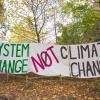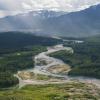This post is Part 2 in a series about NAFTA and its implications on the environment. Read Part 1 here.
Environmental Law Alert Blog
Through our Environmental Law Alert blog, West Coast keeps you up to date on the latest developments and issues in environmental law. This includes:
- proposed changes to the law that will weaken, or strengthen, environmental protection;
- stories and situations where existing environmental laws are failing to protect the environment; and
- emerging legal strategies that could be used to protect our environment.
If you have an environmental story that we should hear about, please e-mail Andrew Gage. We welcome your comments on any of the posts to this blog – but please keep in mind our policies on comments.
As the Trudeau government approaches the middle of its mandate, the Prime Minister faces a choice: Will he deliver on his promise to restore rigour and credibility to Canada’s process for making decisions about industrial projects like mines, dams and pipelines?
Canada’s plan to implement the United Nations Declaration on the Rights of Indigenous Peoples (UNDRIP) will necessitate substantial changes to how we make decisions affecting water.
When it comes to climate change, there is no free lunch. But sometimes people are stuck arguing over the bill.
In 2016, the Ellen MacArthur Foundation reported that plastic debris is currently entering the ocean at a rate of one garbage truck per minute.
West Coast Environmental Law recently published a report called Paddling Together: Co-Governance Models for Regional Cumulative Effects Management.
Even a quick glance at the daily headlines of any paper or newsfeed makes it pretty clear that we are subject to a continuous torrent of disputes over resource development and the risks it presents to ecosystems and human communities.
Road sign along the route of the Tar Sands Healing Walk, Treaty 6 Territory, Alberta, 2014. (Photo: Eugene Kung)
Last century, law turned the tide on many plummeting whale populations through a ban on most commercial whaling.
We congratulate the cities of San Francisco and Oakland for insisting that their taxpayers shouldn’t pick up the full tab for the escalating costs of climate change.










